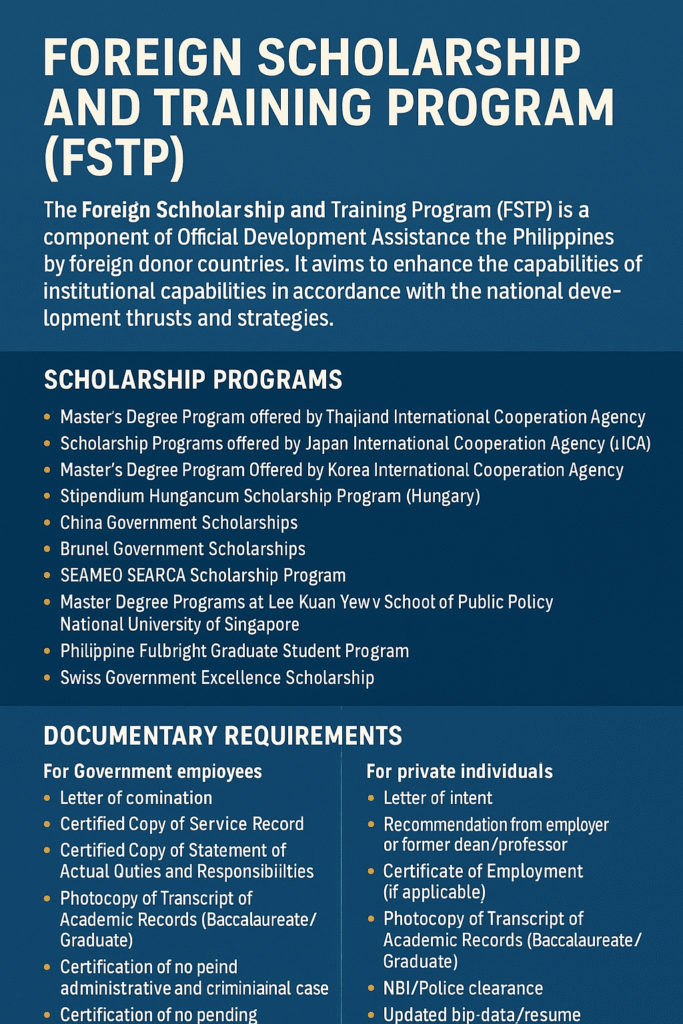Foreign Scholarship and Training Program (FSTP)
Introduction
The Foreign Scholarship and Training Program (FSTP) is a key initiative under Canada’s Express Entry immigration system. It offers skilled trades professionals around the world an expedited and accessible pathway to Canadian permanent residency (PR). The program recognizes the urgent demand for skilled trades workers in Canada while valuing practical experience as much as academic credentials.
Background and Purpose
The FSTP was created to address critical labour shortages in sectors like construction, manufacturing, transportation, and natural resources. By streamlining immigration for qualified tradespeople, Canada combines economic need with its desire to attract globally skilled, job-ready individuals.
Key Objectives
- Address Labour Shortages
Attract skilled trades professionals to fill gaps in vital industries across Canada. - Promote Economic Integration
Provide a structured, fast-track immigration path that supports newcomers in settling and contributing quickly. - Value Practical Skills
Emphasize hands-on trade experience, even in cases where formal education may be limited or absent. - Support Regional Growth
Encourage applicants to settle outside Quebec and within provinces that benefit from their skills.
Eligibility Criteria
To qualify for FSTP, applicants must meet the following requirements:
1. Skilled Work Experience
At least two years of paid, full-time work experience (or equivalent 3,120 hours) in an eligible trade within the last five years Leaving NigeriaArriveIn. The occupation must align with Canada’s National Occupational Classification (NOC) groups: major groups 72, 73, 82, 83, 92, or 93 (excluding sub-major groups 726 and 932), minor group 6320, or unit group 62200 Leaving Nigeria.
2. Job Offer or Certificate of Qualification
Applicants must have either a full-time job offer for at least one year from a Canadian employer or a certificate of qualification issued by a relevant Canadian authority Leaving NigeriaArriveIn.
3. Language Proficiency
Applicants must submit results from an IRCC-approved English or French language test, meeting at least CLB (Canadian Language Benchmark) Level 5 in speaking and listening, and typically CLB 4 in reading and writing ArriveInEuro Immigration Consultants Pvt.LtdIELTSMaterial.com.
4. Education
No formal educational requirement exists, though having a credential may improve Comprehensive Ranking System (CRS) points in Express Entry ArriveInEuro Immigration Consultants Pvt.Ltd.
5. Proof of Funds
Unless already working in Canada with a valid job offer, applicants must demonstrate sufficient settlement funds to support themselves and their family Nationwide VisasArriveIn.
6. Admissibility
Applicants must be legally admissible to Canada—meaning they pass medical checks, have no serious criminal history, and pose no security risks Leaving NigeriaNewBalancejobs.
7. Residency Intent
Applicants must intend to reside outside the province of Quebec unless nominated by a Quebec-specific stream. Those applying through a Provincial Nominee Program (PNP) must live in the nominating province Leaving NigeriaNewBalancejobs.
Application Process
- Create an Express Entry Profile: Submit your profile under FSTP to the IRCC portal to receive a CRS score.
- Receive an Invitation to Apply (ITA): IRCC holds periodic draws; sometimes draws specifically target FSTP candidates with lower CRS thresholds Nationwide VisasOSIVisa.
- Submit PR Application: Upon receiving an ITA, you typically have 60 days to apply for permanent residency. Processing time is generally under six months OSIVisaArriveIn.
- Additional Steps: Provide evidence of language results, job offer or qualification, funds, and pass required checks.
Benefits of FSTP
- Fast Processing: PR processing is often completed within six months OSIVisaArriveIn.
- Lower CRS Threshold: FSTP attracts lower-scoring applicants compared to other Express Entry streams Nationwide VisasOSIVisa.
- Focus on Skills: Practical trade experience may outweigh formal education in eligibility assessments.
- Targeted Draws: IRCC sometimes holds FSTP-only draws, further boosting chances OSIVisa.
- Strategic Integration: Having Canadian work experience enhances job prospects and settlement success OSIVisaimmiperts.com.
Fields of Eligible Trades
The FSTP includes trades in:
- Construction (e.g., electricians, plumbers, carpenters)
- Transportation (e.g., truck drivers, mechanics)
- Manufacturing & Industrial trades (e.g., machine operators, tool and die makers)
- Natural Resources & Agriculture (e.g., forestry workers, oil & gas trades) Leaving NigeriaNewBalancejobs.
Tips for a Successful Application
- Secure a valid job offer or trade certification early.
- Take a language test and aim for CLB 5+ in speaking/listening.
- Prepare proof of funds if needed.
- Ensure all documentation (work proof, NOC alignment) is accurate.
- Watch for FSTP-specific Express Entry draws to maximize your chance.
FAQs
Q1: Is FSTP a scholarship program?
No—despite its name. It is the Federal Skilled Trades Program, an immigration pathway, not a funding opportunity.
Q2: Do I need a degree?
No. Formal education isn’t required, though it can enhance your CRS score.
Q3: Can I come without a job offer?
Yes, if you have a valid certificate of qualification in your trade. Otherwise, a job offer is necessary.
Q4: Can I apply from any country?
Yes. Work experience obtained in any country qualifies, as long as it’s paid and meets NOC requirements.
Q5: What if I want to move to Quebec?
FSTP does not cover Quebec. You need to apply through Quebec’s skilled worker programs.
Conclusion
The Federal Skilled Trades Program (FSTP) is a powerful route for skilled trades professionals to immigrate to Canada efficiently. By prioritizing hands-on experience, facilitating swift processing, and accommodating lower CRS thresholds, FSTP opens doors for many talented individuals. If you meet the eligibility criteria and prepare properly, this program could be your fast track to Canadian permanent residency.
Let me know if you’d like this formatted without headings or expanded further with case studies, province-specific insights, or checklist-style presentation!
